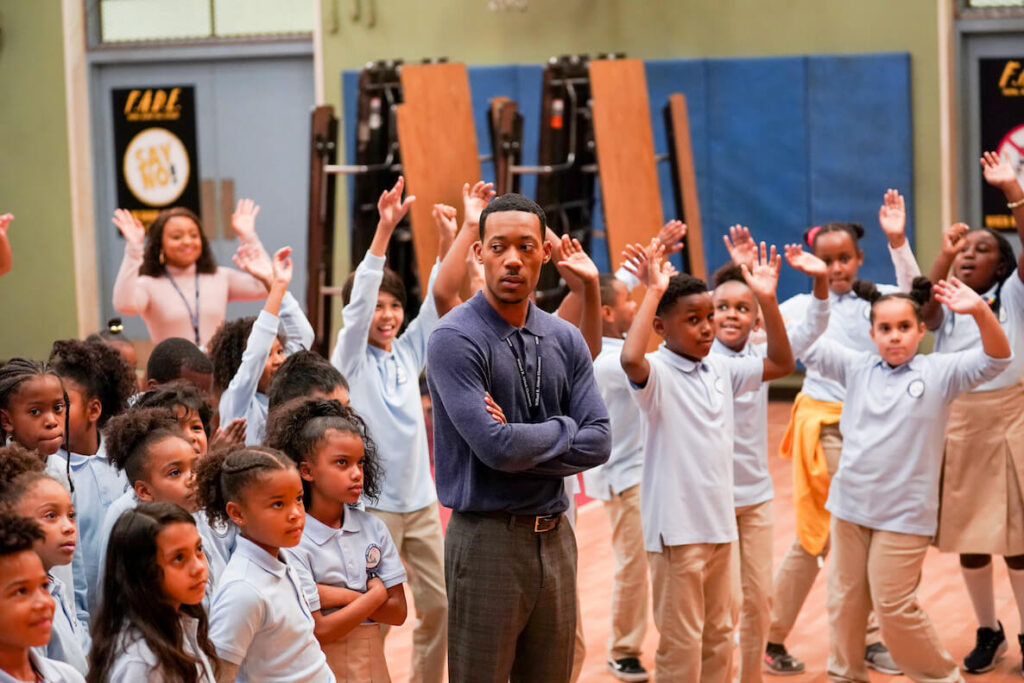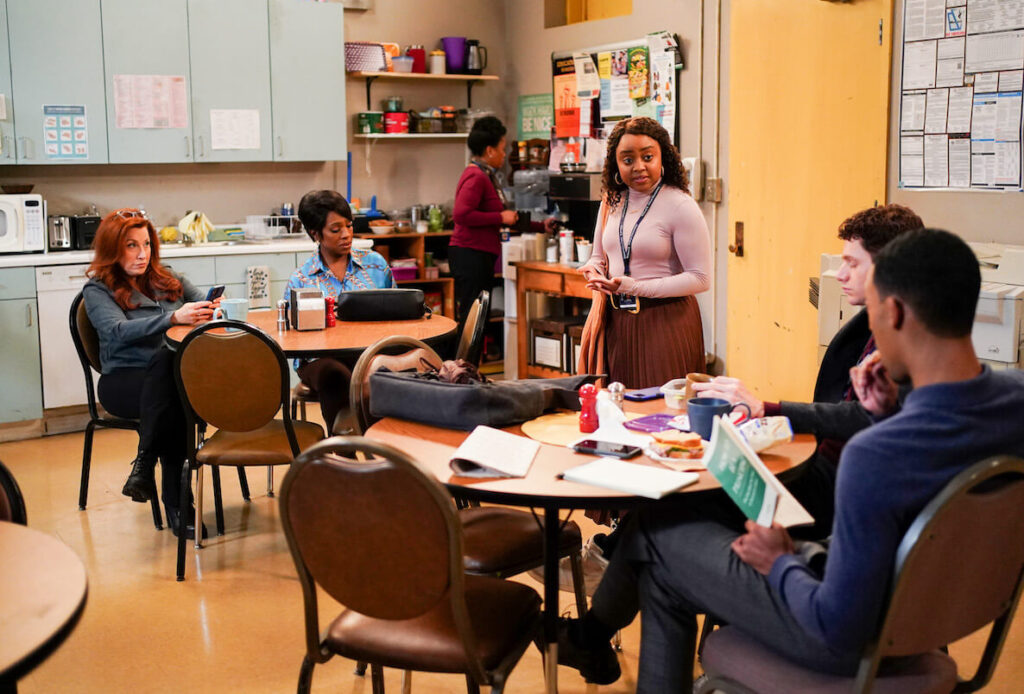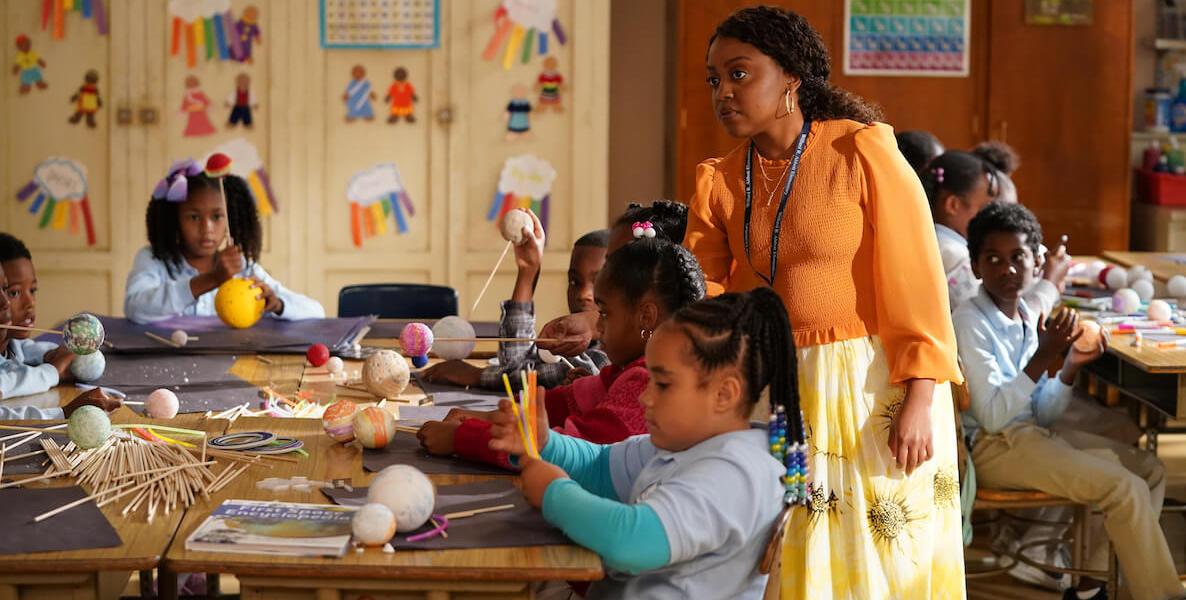Quinta Brunson, the creator, producer, and star of the ABC hit Abbott Elementary, was born and raised in West Philly. Her experience in the sixth grade (2000-01) at Andrew Hamilton Elementary has inspired one of the best half-hour comedies in years to hit network TV.
Quinta Brunson’s sixth-grade teacher was Joyce Abbott, who also grew up in West Philly, graduating from Overbrook High. Abbott, the name of the fictional under-funded Philadelphia public elementary school, is a tribute to Joyce Abbott, who, like many unsung public school teachers—and like the teachers on the TV show—believe in their students; spend their own money to supplement inadequate school supplies; recognize the potential of shy kids; and inspire students to achieve challenging goals.
Abbott Elementary is bringing positive national attention to Philadelphia and its teachers; Philadelphia City Council passed a resolution recognizing Abbott Elementary for its portrayal of dedicated Philly teachers; and the show illustrates to a wide audience why Black teachers are so important in settings like Philadelphia, something our own Center for Black Educator Development is working to increase.
Abbott Elementary is fun to watch. But it’s more than that. It should be required viewing in every university teacher preparation program.
Abbott Elementary as a teacher-education text

For example, Episode 8, “Work Family,” shows Gregory, an inexperienced Abbott teacher, doing his best to prepare his students for the coming standardized math tests. In a direct address to the viewing audience—a hallmark technique of the show—Gregory says, “They tell you not to teach to the test. Then why have tests?” Why indeed? And what kinds of tests should they be?
Gregory has been canceling recess to drill his students on math. To a class of kids overflowing with pent-up energy, he poses a word problem:
“Farmer Hank has seven turkeys. He buys six more. How many turkeys does Farmer Hank have?”
Hands go up. The kids ask, “Are any turkeys pregnant?”
Gregory despairs over this diversion.
Later in the Teachers’ Room, Gregory laments his students’ inattention.
Barbara, an experienced kindergarten teacher, says, “If one child fails, it’s on the child. If all fail, it’s on the teacher.” She then offers Gregory the opportunity to teach a sample lesson to her and to another experienced teacher, South Philly’s own Melissa.
When Gregory presents the turkey-themed math problem, the experienced teachers, like the students, ask if one of the turkeys might be pregnant. An astonished Gregory reveals that his students posed the same question.
“That’s critical thinking,” say the experienced teachers. “Go with it,” they urge. “Diversions are an important part of learning. Otherwise, it’s just memorizing.”
In Gregory’s next math lesson, not only does he encourage questions, relevant and irrelevant, he also gets the kids on their feet and moving to a rap version of the math problem:
“Farmer Hank has two turkeys; he gets two more.
How many turkeys? He has four—Unless one is pregnant with twins, then six!”
This demonstrates an oft-overlooked fact of educating small children: Boys in particular need opportunities to move around to improve their attention span. And, students learn better when they are given the freedom to think creatively about a problem. Our teacher-education programs need to incorporate those lessons into their coursework, so educators can better succeed in the classroom.
Abbott Elementary also highlights problems

Abbott’s principal, Ava Coleman, unlike the dedicated teachers, is a self-serving, political piece of work. She may not be representative of Philly public school principals, but whether she is or not, it’s imperative that Philadelphia universities take responsibility for training and re-training school leaders. A principal who puts students first and empowers teachers goes a long way toward making a school successful.
Unfortunately, , we may be facing an exodus of school leaders. It’s good news that Penn and Temple are partnering to offer grants to increase the diversity of school principals, but universities should also be working now to develop courses and seminars to educate a new group of 21st-century public school principals and supervisors. If Principal Ava decided to depart from Abbott, it might not be a big loss, unless she could not be promptly replaced. Then again, maybe even Principal Ava could be reeducated.
We also know that too many Philadelphia teachers are departing mid-year in large numbers. That’s why, as I wrote about before, Philly needs a Substitute Teacher Academy, a consortium of universities in cooperation with the School District of Philadelphia working to train college-educated professionals for short-term teaching roles. This is one way to ensure open positions don’t leave students with learning interruptions.
The disrepair of Philly public schools must be addressed
When Janine, the Quinta Brunson character, runs out during a rainy lunchtime to get chicken for her colleagues from Danny’s Wok (57th and Baltimore), the camera lingers for a moment on the rain splashing into a bucket from a leaky roof. The building’s disrepair is a fact of life that all the teachers must live with.
There hasn’t been a reference yet to lead in the drinking water, but that’s also a wide-spread condition. My daughter, a second-grade teacher at the Powel School, tells me that her school filters its water. Let’s hope that all schools have the capacity to do so.
Former Penn President Amy Gutmann did a great thing by investing $100 million dollars of university funds in repairing Philadelphia public schools. The university, which recently agreed to adopt Lea Elementary, could do more— let’s cheer on incoming President Elizabeth Magill to make additional commitments.
We must promote the quality of neighborhood schools

Episode 6 of Abbott Elementary, ”Gifted Program,” addresses the issue of students with special talents and effectively conveys the concept of multiple intelligences, developed by Harvard Professor Howard Gardner.
The idea is that teachers must help students discover their strengths, whether traditional academic, artistic, cyber, or otherwise. Teachers should be prepared to meet students where they are and help them to reach a variety of individual goals.
That brings me to the recent—understandable—frenzy over new criteria for admission to Masterman, Central and other prestigious Philadelphia public high schools.
There’s little doubt that the Philadelphia School District should have handled the situation quite differently, perhaps like New York City with careful, community-involved research. It’s essential to achieve equity goals.
But let’s be realistic. Many kids had no chance at all of being selected for a prestigious school. Only those with active, involved parents had a shot. What about overworked parents who are not familiar with the procedures and machinations for getting into magnet schools?
True equity requires improving neighborhood schools. One parent quoted in an Inquirer article, after her child lost out in the lottery, resigned herself to sending her student to the local high school, Benjamin Franklin. When she requested a tour, she was told that no one had ever asked for that before. Clearly, non-magnet high schools are not encouraged or prepared to educate kids to be college-ready.
It wasn’t always this way. Like Quinta Brunson and Joyce Abbott, I’m a West Philly girl, albeit from another generation. I remember quite clearly the decision I made as a 9th grader at Shaw Jr. High. The only magnet school available to me at that time was Girls’ High. I did not want to endure the inconvenient commute, involving bus, trolley and subway from 57th and Florence to Broad and Olney, where Girls’ High is located. I was deeply involved in co-curriculars and did not want to sacrifice those activities to time on public transportation.
RELATED: 18+ ways to help students and teachers succeed this year
I chose to attend my neighborhood high school, John Bartram, and got a great college-preparatory education there, with opportunities to perform in three school musicals, write plays for the assembly, edit the school newspaper, and tutor Latin. At graduation, as the top student in my class, I received a full scholarship to the University of Pennsylvania. Bartram prepared me well to achieve Phi Beta Kappa in my junior year at Penn and to go on to receive a Penn PhD with distinction. We won’t have true equity in Philadelphia public schools until these opportunities exist once again.
Abbott Elementary demonstrates how dedicated teachers can create excellence and opportunity in the early grades. Let’s commit ourselves to reforming Philadelphia public education so that all neighborhood schools at all levels are sufficiently supported to provide a first-rate education.
Elaine Maimon, PhD, is author of Leading Academic Change: Vision, Strategy, Transformation. Follow @epmaimon on Twitter.
![]() RELATED
RELATED
Reality Check: Philly Schools Are Like a Slow-Moving Asteroid
Header photo of Quinta Brunson in Abbott Elementary. | Photo by Gilles Mingasson / ABC



